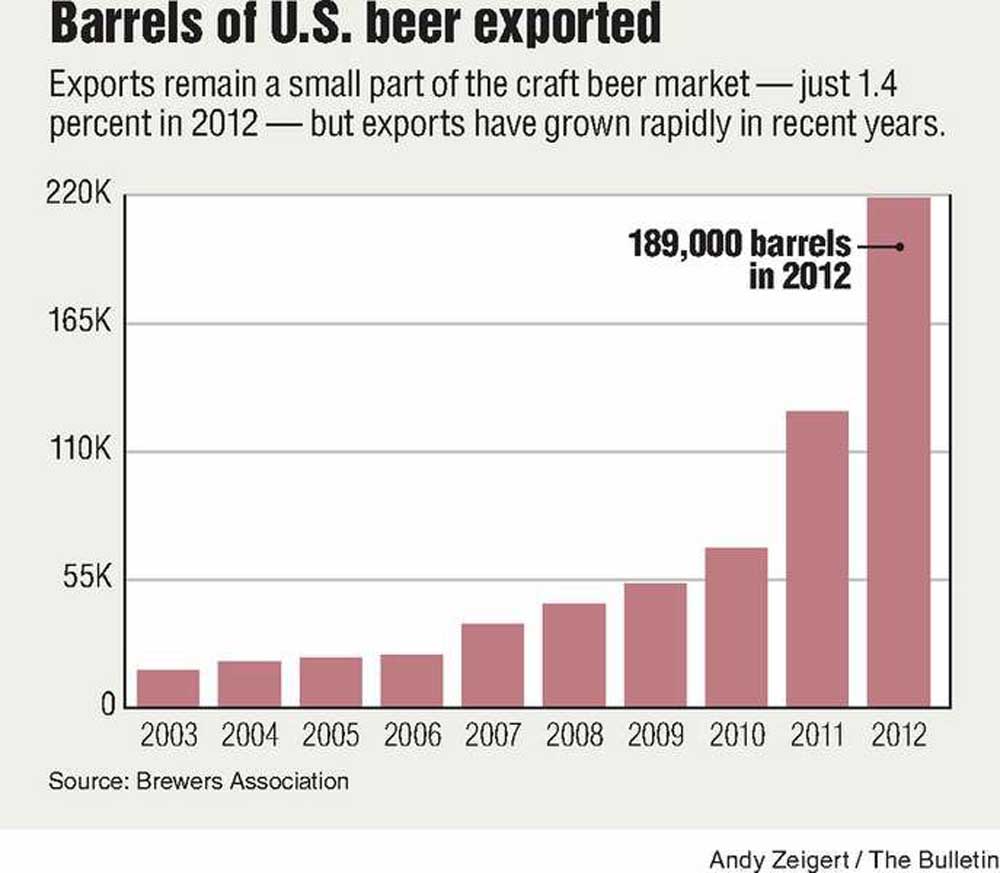To the Pacific Rim
Published 5:00 am Sunday, October 20, 2013

- To the Pacific Rim
Deschutes Brewery beer is available in the western U.S., much of the Midwest and in two Canadian provinces.
But lesser known is that the brewery quietly entered several international markets on a small scale this summer. Deschutes beer is now officially available in Thailand, Singapore, Sweden, and later this fall, in Australia and New Zealand.
But while the brewery has been building its global presence, international distribution at this stage never figured into Deschutes’ game plan.
“We always had a lot of people approaching us to ship our beers to other countries,” said Deschutes Brewery CEO Gary Fish. “But we felt like we didn’t really need that. We’re currently in not quite half the United States. The idea of shipping beer overseas seemed a little silly to us, quite frankly.”
But when the quality of its beer came under threat because of unauthorized distributors in Singapore, Deschutes’ plans changed. Company officials received reports earlier this year that a large supply of Deschutes beer was circulating in Singapore — beer that the company had not authorized for distribution to that country. The beer, brought into Singapore legally by an unknown exporter based in California, was far past its “best by” date, meaning that consumers in the country were drinking stale beer.
According to Singapore’s Beerstyle Distribution owner Winston Kwang, the distributor’s identity was unknown, although it may have been based in California.
“Many consumers think that beer can be stored any old how and that it can be kept anywhere,” said Kwang, whose company is now the official distributor of Deschutes beer in Singapore. “There’s a total disregard for the transportation of beer in Asia.”
Fish noticed this when he visited Thailand in June and saw a truckload of domestic beer left in the sun.
“Nobody’s under pressure to look after it,” Fish said. “We saw beer sitting on the sidewalk on a 90-degree day with high humidity. Those are brutal conditions that our beer would fare very poorly under.”
Kwang said the unknowndistributor most likely used the cheapest method to ship Deschutes beer, which meant the cases traveled around the world for months before reaching Singapore, where they were left in direct sunlight and heat. According to Kwang, Deschutes wasn’t the only beer that was being shipped to Singapore under these practices.
“Stone (Brewing Co.) was actively searching for the wayward distributor,” Kwang said. “But that’s like looking for a needle in a haystack.”
Perishable product
Concerned about the reputation of its beer, Deschutes finally decided to address the problem head on.
“The strategy for us was to have our beer available to people who want to buy it while also eliminating that grey market,” said Michael LaLonde, Deschutes Brewery president.
Kwang, also the Singapore distributor for Rogue Ales and Stone Brewing Co., started importing Deschutes beer in June. Each month, he imports one or two pallets of Deschutes beer cases, which adds up to about 60 cases of beer per pallet. To ensure freshness, Kwang contracts with a wine exporter from Napa Valley, Calif., which keeps the beer refrigerated during shipment and away from direct sunlight from the moment it leaves the brewery until it reaches retailers. Refrigeration is an absolute must, Fish said, and is a step required of all of Deschutes’ distributors.
“Beer is perishable,” Fish said. “Heat can damage it severely. I mean, you wouldn’t cook a bottle of wine. You wouldn’t do that with beer, either.”
The logistics of shipping craft beer overseas while maintaining its quality is a challenge unto itself. Kwang said the beer travels for a little over a month before it arrives in the country, leaving him with a limited time to distribute to local retailers before the beer’s “best by” date is up.
Unlike European beers, which have generous expiration dates of up to a year, American craft beer is generally marked with “best by” dates, which tell consumers when a beer should be consumed for optimal flavor. For Deschutes, most best-by dates range between four and six months from the time it is brewed. Deschutes routinely taste tests its beer to determine these dates, which vary depending on the category of beer, said LaLonde.
The discrepancy between American craft beer “best by” dates and European standard expiration dates have been somewhat of a challenge, said Kwang, because Singaporeans are used to the expiration dates on more familiar European beers.
“I really have to stress to retailers and consumers that it’s safe to drink, even after the best by date,” Kwang said. “People sometimes worry about that, and I can’t blame them. I have to get letters from the breweries that reassure them, saying, ‘Don’t worry, it’s not going to kill you. It’s just that the taste is downgraded after that date.’”
Kwang said Singaporean beer drinkers responded enthusiastically to the Deschutes label. Every month, he sells out, and the brand continues to gain popularity, especially now that customers are able to taste it the way its brewers intended.
“The funny thing is that when (grey market) Deschutes first got here, people were already going gaga over their beer,” Kwang said. “But when I started distributing mine, people were shocked that it was the same beer. They’d say, ‘I can’t understand. This is easily 10 times better than the other one I had.’ I’m happy when I hear that because I know the money I spent on shipping is well worth it.”
Because of high shipping costs, a pint of craft beer generally goes for $13 in Singapore, a few dollars higher than a European export. So far, Deschutes has shipped 1,200 cases of beer to Singapore. In that time, Kwang said the grey market has virtually disappeared.
And beyond
Deschutes is also braving new territory in Thailand. Aaron Grieser, a University of Oregon law school graduate and co-founder of Beervana, the official Deschutes distributor in Thailand, said that until recently, the craft brew scene there was practically non-existent. Strict laws controlled the importation of alcohol into the country.
“It was kind of how the craft beer scene was 30 years ago in America,” Grieser said. “There was really only boring, bland beer available and just a handful of hard-to-find craft beers. I saw this amazing opportunity.”
Grieser grew up in Eugene, and said that he always considered Deschutes’ Mirror Pond Pale Ale his “converter beer,” the brew that changed his perspective on the beverage. His love for craft beer spurred the founding of Beervana, which imports American craft beer into Thailand. Grieser was working in Thailand’s renewable energy field when, missing home and its abundance of craft beer, he decided to start his own import company. He took a two-year driving trip down the U.S. West Coast, stopping at almost every brewery along the way to ask them if they would export their beer to Thailand. He begged Deschutes for nearly two years before company officials came around.
“I had to do a lot of due diligence for those guys,” Grieser said in a Skype interview. “I had to make sure that the beer tastes here exactly how it does when you pop off a bottle cap in Bend.”
Grieser, who also imports beer from Rogue Ales, Lagunitas Brewing Co. and Anderson Valley Brewing Co., follows Deschutes’ stringent shipping practices, paying almost double shipping costs for refrigeration. In June, Beervana brought its first pallet of Deschutes beer to Thailand. The entire shipment sold out before it arrived in Bangkok.
Since then, Grieser has increased his imports by an additional pallet of beer per month. He imports most Deschutes varieties, including Mirror Pond Pale Ale, Black Butte Porter, Chainbreaker White IPA and Deschutes River Ale, along with seasonal varieties. Mostly, the beer is distributed to high-end restaurants at about $8 to $12 a bottle, catering to a large audience of expatriates and locals alike.
“There’s a surging demand for craft beer here,” Grieser said. “There’s so much excitement for Deschutes.”
Grieser often hears from Americans who are surprised to find Deschutes beer in Thailand, as they can’t even find the beer in their own home states. Grieser said distributing craft beer in a foreign country in some ways is easier than distributing it back home.
“I think we’re at a bit of an advantage than some American states, even though we’re on the other side of the world,” Grieser said. “Here, the beer is culturally original. You’re not just selling liquid, your translating a culture.”
And with that translation sometimes comes confusion. In terms of marketing, Grieser said Thais, the majority of whom live in urban settings, don’t quite grasp the independent, outdoorsy spirit that Deschutes portrays on its labels. He said he’s working to translate the brand image to something more easily understood by urbanites. In January 2014, Grieser said, he will help implement a brewery campaign around the idea of locals rediscovering Bangkok while rediscovering beer. Special Deschutes Brewery benches, constructed from the beer’s shipping pallets, will be placed around the city as part of the campaign.
So far, 1,000 cases of Deschutes beer have been exported to Thailand.
Swedish tastes
Deschutes’ largest overseas shipments have gone to Sweden, which has been on the receiving end of 2,000 cases this year. Part of the reason for this, Fish says, is that the American craft beer market is better established in Scandinavia, with many East Coast breweries having distributed in that country for a long time.
Canada is the largest international market for Deschutes, with about 25,000 cases being shipped to British Columbia and Alberta this year.
Deschutes has been in Canada for five years. This fall, the brewery plans to expand into Australia and New Zealand, two countries Fish said are already familiar with Deschutes beer via unauthorized distributors.
Aside from Rogue Brewery, which is in over 20 countries and has been exporting beer internationally since 1994, few, if any, Oregon breweries have officially ventured outside the U.S., according to Brian Butenschoen, executive director of the Oregon Brewer’s Guild. That may be changing.
“If you asked me a year ago, I would have said zero (breweries distributing outside of North America) besides Rogue,” said Butenschoen. “I guess when it gets to the point where it makes as much sense to send a container of beer to Asia as much as it does to send stuff on railcar to the eastern part of the U.S., that’s probably the point when breweries might consider going international.”
Bart Watson, staff economist for the Brewers Association, said only a small subset of American breweries exports their product.
“Most craft producers are doing everything they can to fill demand in local and regional markets,” Watson said. “It’s still such a small percentage of craft that we haven’t tracked it systematically.”
Altogether, international exports account for a minor portion of Deschutes’ profits, though the market has grown by over 11,000 cases from 2012. So far this year, 29,200 cases of Deschutes beer have sold internationally, with combined sales domestically and abroad equalling 2.8 million cases.
Fish described Deschutes’ international endeavors as “dipping a toe in the water,” though the brewery is often approached by distributors around the world who want to import Deschutes beer. The brewery, which will primarily focus on growing domestically, plans on expanding slowly into other countries, with an emphasis on markets where their beer has already been distributed without brewery approval.
“The priority is to kill this bootleg market that cropped up, because it’s very bad for the brand,” Fish said. “People aren’t going to blame the bootleggers when they taste bad beer, they’re going to blame us.”
Beer exports
Exports of craft beer to international markets grew from an estimated 14,000 barrels in 2003, to 189,000 barrels in 2012, said Bart Watson, staff economist for the Brewers Association. That is an increase of 1,250 percent. However, it remains a small piece of the craft beer market. U.S. craft brewers produced 13.2 million barrels in 2012 and exported just 1.4 percent of that, according to the Brewers Association. The association does not track exports by state or brewery.






